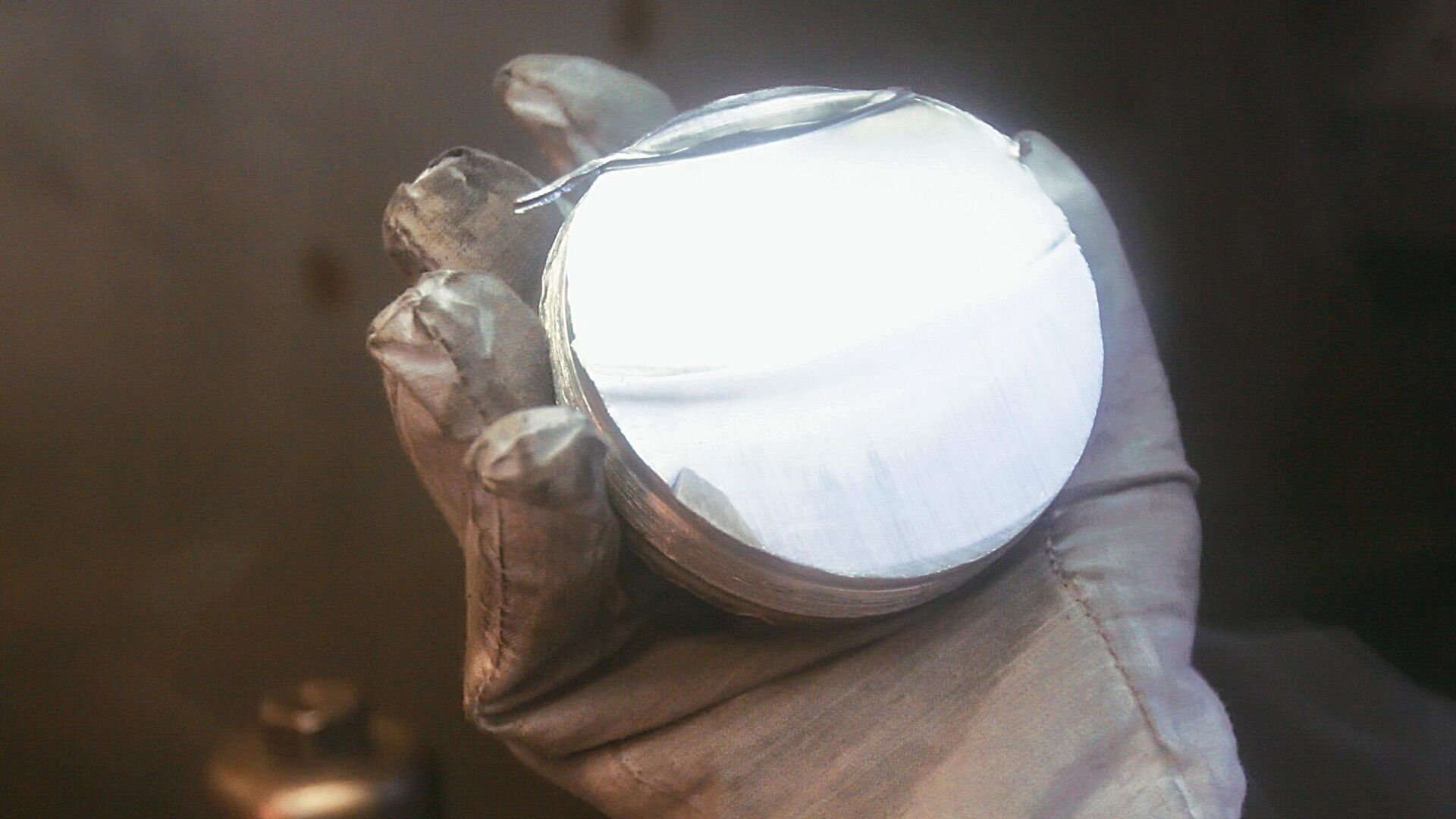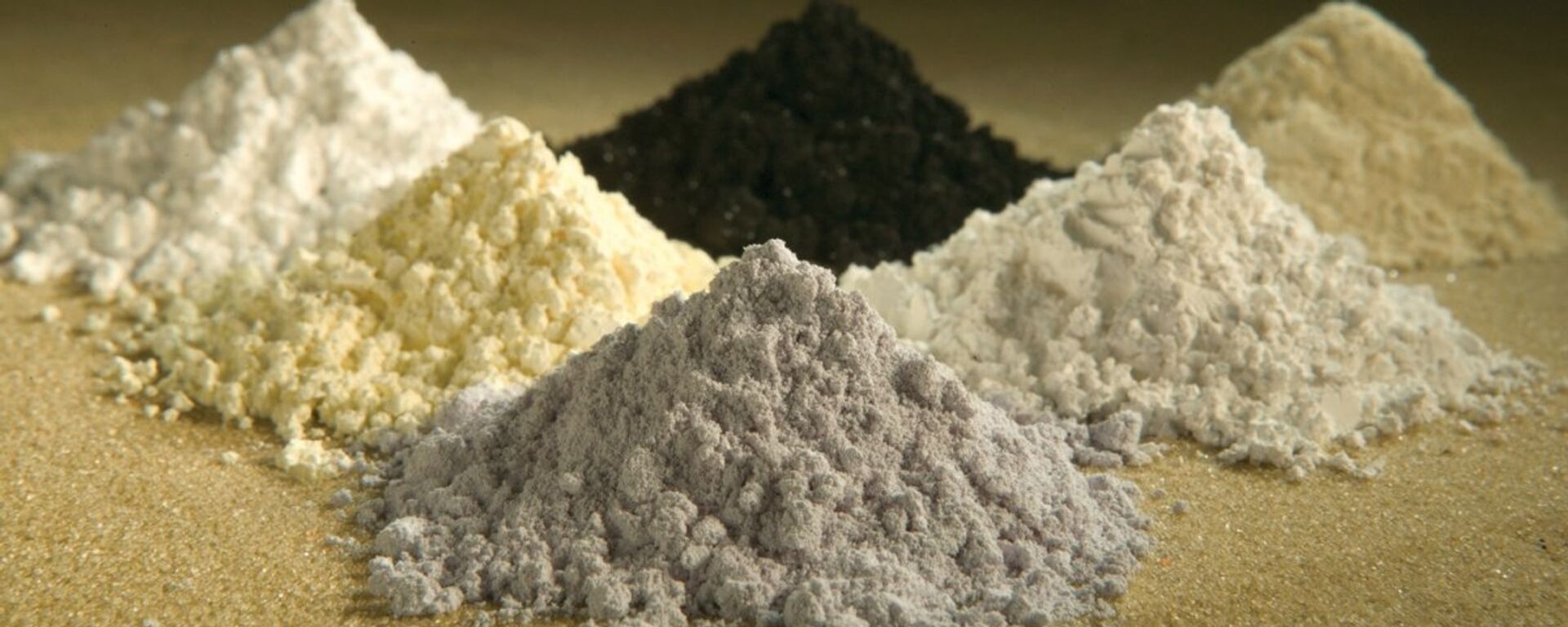https://sputnikglobe.com/20230831/one-of-largest-known-lithium-deposits-found-in-ex-volcano-on-nevada-oregon-border-1113030534.html
One of Largest-Known Lithium Deposits Found in Ex-Volcano on Nevada-Oregon Border
One of Largest-Known Lithium Deposits Found in Ex-Volcano on Nevada-Oregon Border
Sputnik International
A mining company has published a new scientific paper claiming that the McDermitt Caldera, which straddles the border between the US states of Oregon and Nevada, could contain some of the largest lithium deposits in the world.
2023-08-31T21:22+0000
2023-08-31T21:22+0000
2023-08-31T21:20+0000
americas
lithium
lithium ion battery
mining
volcano
us
native americans
https://cdn1.img.sputnikglobe.com/img/07e7/01/1e/1106816226_0:0:2049:1153_1920x0_80_0_0_76bd065e87c3dec51d64a5f38fb66319.jpg
The paper was published in the peer-reviewed journal Science Advances on Wednesday by three authors: Thomas Benson, Matthew Coble and John Dilles, representing Lithium Americas Corporation, GNS Science, and Oregon State University, respectively.The trio studied the ground under the McDermitt Caldera, a vast crater formed more than 16 million years ago by the volcanic hotspot that today sits in Yellowstone National Park. At 600 square miles, the crater has long been a potent source of minerals, including mercury and uranium, and was already known to contain some lithium deposits in the Thacker Pass, where Lithium Americas won a concession in 2017.However, the authors found by analyzing three drill core samples that the ground inside the caldera contains huge amounts of illite, smectite, and tainiolite - three minerals packed full of lithium rocks. The group hypothesize that such high concentrations were reached by a complex mix of naturally occurring lithium in the volcanic rock, plus a later process of magma leaking from cracks in the volcano’s magma chamber as the caldera’s floor was forced upward, forming the Montana Mountains. Those leaks carried even more lithium up from deep inside the Earth and deposited it in the clays that line the caldera’s surface.However, they caution that the situation in the McDermitt Caldera is somewhat unique, and most former volcanic areas are not likely to contain significant lithium deposits due to other mitigating reasons.Their study did not contain an estimate for the physical amount of lithium that could likely be mined from the deposits.However, Lithium Americas has faced stiff resistance from local groups since it bought the concession in 2017, including the Great Basin Resource Watch and several local Native American tribes, who argue mining threatens their local water sources, sensitive wildlife, and sacred sites. In July, a federal court rejected their challenge, approving the mining company’s project.A soft, silvery-white metal that is both highly reactive and flammable, lithium has become increasingly valuable in recent years amid the rush to replace fossil fuel-powered automobiles with electric-powered ones, for which lithium is a key ingredient in the best batteries.In Bolivia, which mines lithium on the Salar de Uyuni salt flats, the November 2019 coup that ousted leftist President Evo Morales in favor of a far-right, pro-US government, was widely seen as an effort to halt the country’s efforts to control lithium mining within its borders. At the time, some 70% of the world's known lithium deposits were in Bolivia.Elon Musk, the owner of the electric vehicle maker Tesla, was popularly suspected of having a hand, or at least hugely benefiting from, the coup after resuming plans to build a Tesla factory in neighboring Brazil that would receive its lithium from Bolivia. When challenged on it on social media several months later, Musk fired back in a now-deleted post: “We will coup whoever we want! Deal with it.”Musk later claimed the post was a joke and that Tesla gets its lithium from Australia.
https://sputnikglobe.com/20230801/chinas-rare-earths-ban-may-sink-us-microchip-manufacturing-ambitions-1112322954.html
https://sputnikglobe.com/20230731/france-assures-eu-can-survive-influx-of-budget-chinese-evs-as-russia-sanctions-take-toll-1112272135.html
americas
Sputnik International
feedback@sputniknews.com
+74956456601
MIA „Rossiya Segodnya“
2023
News
en_EN
Sputnik International
feedback@sputniknews.com
+74956456601
MIA „Rossiya Segodnya“
Sputnik International
feedback@sputniknews.com
+74956456601
MIA „Rossiya Segodnya“
lithium; electric vehicles; mcdermitt caldera; lithium mining; people of red mountain
lithium; electric vehicles; mcdermitt caldera; lithium mining; people of red mountain
One of Largest-Known Lithium Deposits Found in Ex-Volcano on Nevada-Oregon Border
A mining company has published a new scientific paper claiming the McDermitt Caldera, which straddles the border between the US states of Oregon and Nevada, could contain some of the largest lithium deposits in the world. The soft metal is highly sought after as a key material in electric vehicle batteries.
The paper was
published in the peer-reviewed journal Science Advances on Wednesday by three authors: Thomas Benson, Matthew Coble and John Dilles, representing Lithium Americas Corporation, GNS Science, and Oregon State University, respectively.
The trio studied the ground under the McDermitt Caldera, a vast crater formed more than 16 million years ago by the volcanic hotspot that today sits in Yellowstone National Park. At 600 square miles, the crater has long been a potent source of minerals, including mercury and uranium, and was already known to contain some lithium deposits in the Thacker Pass, where Lithium Americas won a concession in 2017.
However, the authors found by analyzing three drill core samples that the ground inside the caldera contains huge amounts of illite, smectite, and tainiolite - three minerals packed full of lithium rocks.
The group hypothesize that such high concentrations were reached by a complex mix of naturally occurring lithium in the volcanic rock, plus a later process of magma leaking from cracks in the volcano’s magma chamber as the caldera’s floor was forced upward, forming the Montana Mountains. Those leaks carried even more lithium up from deep inside the Earth and deposited it in the clays that line the caldera’s surface.
“What’s really special about this deposit is you already had a big lithium inventory to begin with, and then you have this massive influx of all this lithium-rich fluid that caused hyper lithium enrichment on a giant scale,” Benson told US media.
However, they caution that the situation in the McDermitt Caldera is somewhat unique, and most former volcanic areas are not likely to contain significant lithium deposits due to other mitigating reasons.
Their study did not contain an estimate for the physical amount of lithium that could likely be mined from the deposits.
However, Lithium Americas has faced stiff resistance from local groups since it bought the concession in 2017, including the Great Basin Resource Watch and several local Native American tribes, who argue mining threatens their local water sources, sensitive wildlife, and sacred sites. In July, a federal court rejected their challenge, approving the mining company’s project.
“The global search for lithium has become a form of ‘green’ colonialism,” People of Red Mountain, a Native American organization that aims to protect the sacred site, said in an August statement. “The Caldera holds many first foods, medicines, and hunting grounds for tribal people both past and present.”
A soft, silvery-white metal that is both highly reactive and flammable, lithium has become increasingly valuable in recent years amid the rush to replace fossil fuel-powered automobiles with electric-powered ones, for which lithium is a key ingredient in the best batteries.
In Bolivia, which mines lithium on the Salar de Uyuni salt flats, the November 2019 coup that ousted leftist President Evo Morales in favor of a far-right, pro-US government, was
widely seen as an effort to halt the country’s efforts to control lithium mining within its borders. At the time, some 70% of the world's known lithium deposits were in Bolivia.
Elon Musk, the owner of the electric vehicle maker Tesla, was popularly suspected of having a hand, or at least hugely benefiting from, the coup after resuming plans to build a Tesla factory in neighboring Brazil that would receive its lithium from Bolivia. When challenged on it on social media several months later,
Musk fired back in a now-deleted post:
“We will coup whoever we want! Deal with it.”Musk later claimed the post was a joke and that Tesla gets its lithium from Australia.




